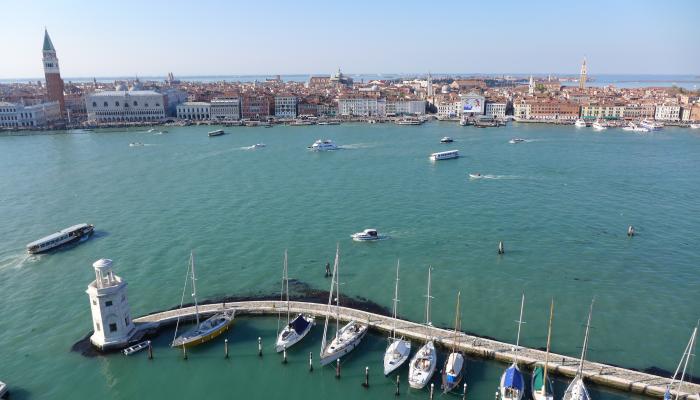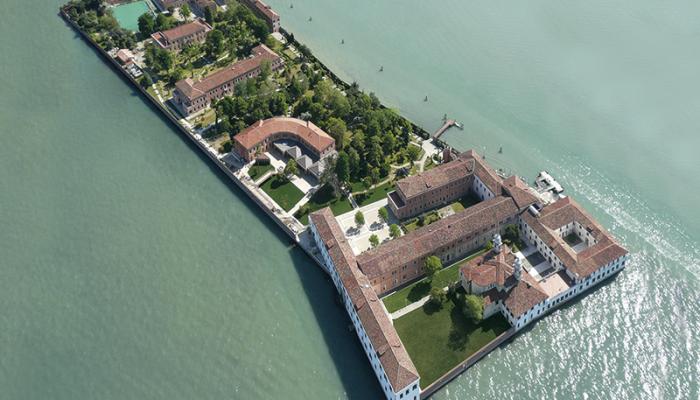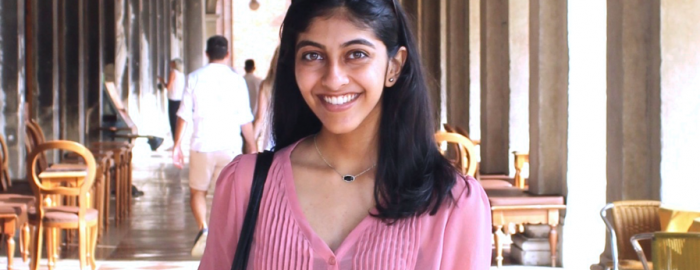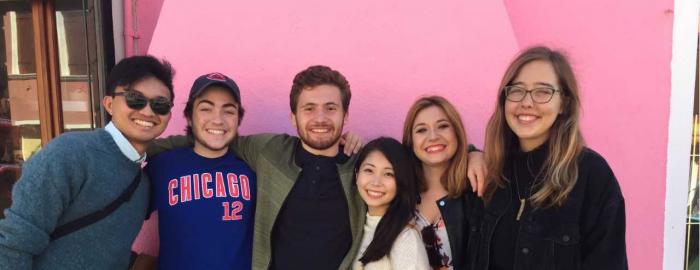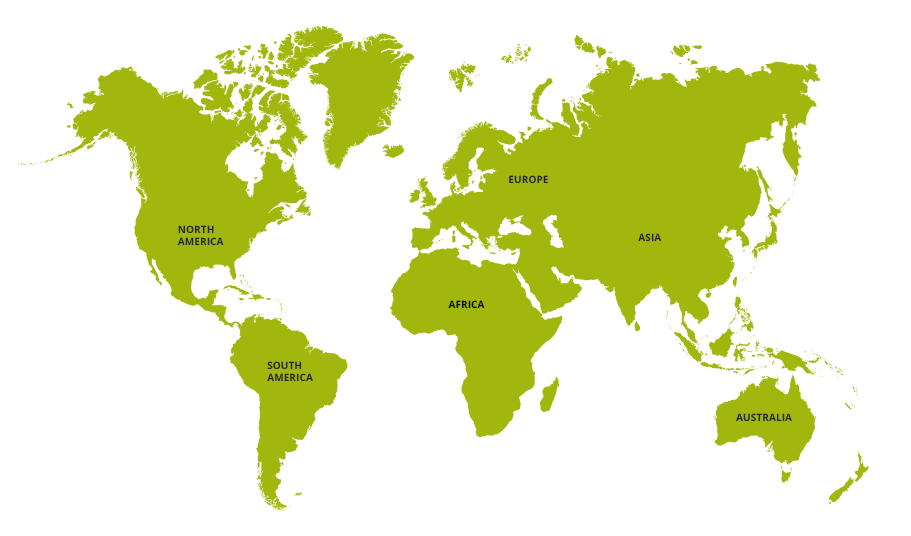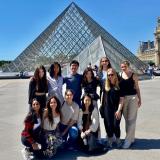Duke in Venice
Semester Program
An International Academic Experience
Apply NowCourses Taught in English
Duke in Venice is based at Venice International University (VIU) located on the island of San Servolo. VIU is an association of universities and organizations from around the world. Faculty from the partner universities offer courses at VIU, all taught in English.
San Servolo island is located in the Venetian lagoon, between Venice's main city center and the island of Lido. It takes 10 minutes by boat to reach Piazza San Marco, the heart of Venice, and 20 minutes to reach Venice International Airport Marco Polo.
Duke in Venice students enroll in the VIU Globalization Program of the School of Humanities and Social Sciences. The program brings together talented, motivated students from VIU member universities in a truly multicultural, international, and interdisciplinary environment.
Although no previous knowledge of Italian is required, it is strongly recommended that students begin study of the language before arriving in Venice. Italian language will be a required course for students on the program.
PROGRAM FAST FACTS
Location: Venice, Italy
Term: Fall, Spring, or Academic Year
Dates: FALL 2024: September 8–December 21, 2024; SPRING 2025 TBD
Application Deadline: March 1 (Fall and Academic Year); October 15 (Spring)
Academic Theme(s): Italian History and Culture, Cultures of the World, Global Challenges
Credit Type: Duke Credit
Eligibility: Non-Duke students are welcome to apply.
Housing: Dormitory and apartments
GEO Advising: Request an appointment
ACADEMICS
The normal courseload is four courses. All courses will carry Duke departmental designations and numbers, and will convey to your transcript as Duke credit.
- Italian Course – One required: One of the four courses you are required to take is an Italian language course, appropriate to your language ability and background.
- Electives – Choose three: For the remaining three courses, you will choose electives from a listing of 15-20 courses that are English-taught at VIU by the Duke faculty member in residence and faculty from the partner universities. The subject matter, resident faculty, and the departments to which the courses pertain change with each semester. GEO works closely with departments at Duke to determine which Duke prefixes and number designations the courses will carry.
- FALL 2024
- SPRING 2025
FALL 2024
Fall 2024 Courses
Please note the offerings for Fall 2024 are subject to change. The subject matter, resident faculty, and the departments to which the courses pertain change with each semester. Consult the VIU website for an official list of course offerings for the current/upcoming term, along with course descriptions and syllabi.
Use the list below to find the corresponding Duke departmental designation(s) and number(s) for each course.
Required Course
Italian for Foreigners - beginner, intermediate, upper intermediate
Massimo Brunzin (coordinator), Venice International University
ITALIAN 101A (FL) VIU Beginner level
ITALIAN 102 (FL) VIU Intermediate level
ITALIAN 290A-1 VIU Upper Intermediate level
ITALIAN 390A (FL) VIU Advanced level
Electives
ITALY
History of Venice
Luca Pes, Venice International University
HISTORY 390A (CZ, CCI)
Italian Contemporary History in Films
Luca Pes, Venice International University
HISTORY 390A-12 (CCI, CZ, ALP)
Art and Architecture in Renaissance Venice
Cosimo Monteleone, Università degli Studi di Padova
ARTHIST 390A (ALP, CZ)
CULTURES OF THE WORLD
Comparing East and West: Japan’s Peacebuilding: Toward the UN and Asian Policies
Mitsuru Yamada, Waseda University
Duke Course Number TBD
Intercultural Communication: Strategies to Build Intercultural Competence using English as a Lingua Franca in a Multilingual Setting
Sara Garfield, Université de Bordeaux
Duke Course Number TBD
Gender Studies. Growing into/out of Gender Identities: Gender, Age and Romance on Screen
Danielle Hipkins, University of Exeter
CINE 290A, VMS 390A (ALP)
GLOBAL CHALLENGES
Identity Heritage and Globalization. Transnational Televisions and their Audiences
Danielle Hipkins, University of Exeter
Duke course number TBD
Globalization, Ethics Welfare and Human Rights. The question of Globalization, Ethics and Human Rights in Mediterranean Mobility, Border policies and Migration
Natalie Göltenboth, Ludwig Maximilians Universität
CULANTH 290A, POLSCI 290A, PUBPOL 390A, ICS 390A (SS, EI)
Global Governance for Peace and Security, Cooperation and Development. The Asian Peacebuilding from the Viewpoint of International Security Cooperation
Mitsuru Yamada, Waseda University
Duke course number TBD
ECONOMICS, MANAGEMENT, and DIGITAL TECHNOLOGIES APPLIED TO CULTURAL HERITAGE (Fall Specialization Track)
Cities and Cultural Production
Massimiliano Nuccio, Università Ca’ Foscari Venezia
ECON 290A, SOCIOL 390A (SS, CCI)
Print Culture in the Digital Age
Kirsten Stirling, Université de Lausanne
Duke course number TBD
Extracting Heritage. The Incredible Rise of Marginal Territories in the Venice Lagoon
Michela Pace, Università Iuav di Venezia
Duke course number TBD
Digital Tools and Cultural Heritage
Fatima Zahra Fakir, Università degli Studi di Padova
Duke course number TBD
SCIENCE AND SOCIETY (Fall Specialization Track)
Strategies for Effective Science Communication
Sara Garfield, Université de Bordeaux
PUBPOL 390A (CCI)
Science Communication and Sustainability
Alessandra Fornetti & Ilda Mannino, Venice International University
Duke course number TBD
Physics of Society, Cities and States
Klemen Bohinc, University of Ljubljana
Duke course number TBD
HISTORY AND MEMORY (Fall Specialization Track)
Modern and Premodern Gender, Race, and Power across Cultures
Driscoll
GSF 390, HISTORY 390A, SOCIOL 390A (CZ, SS, CCI)
Films and the Narratives of Empire: Remembering the Past
Rob Savage, Boston College
Duke course number TBD
Between Memory and History, Remembering 1968: Revolt, Art, History and Philosophy
Rob Savage, Boston College
Duke course number TBD
The Venice Biennale between the Legacy of its History and Artistic Memory Practice - an Anthropological Approach
Natalie Göltenboth, Ludwig Maximilians Universität
CULANTH 290A, ARTHIST 390A (ALP)
Shakespeare, Commedia dell’Arte, and Cultural Memory
Kirsten Stirling, Université de Lausanne
Duke course number TBD
Humanitarian Visual Culture
Francesco Zucconi, Università Iuav di Venezia
Duke course number TBD
Memory, Identity and Fantasy in Private Photography
TBD
VMS 390A (ALP)
Consult the VIU website for an official list of course offerings for the current/upcoming term, along with course descriptions and syllabi.
SPRING 2025
Spring 2025 Courses
Please note the courses listed below are sample courses and the offerings for Spring 2025 are subject to change. The subject matter, resident faculty, and the departments to which the courses pertain change with each semester. Consult the VIU website for an official list of course offerings for the current/upcoming term, along with course descriptions and syllabi.
Use the list below to find the corresponding Duke departmental designation(s) and number(s) for each course.
Required Course
Italian for Foreigners - beginner, intermediate, upper intermediate
Massimo Brunzin (coordinator), Venice International University
ITALIAN 101A (FL) (VIU's Italian for Foreigners Beginner)
ITALIAN 102A (FL) (VIU’s Italian for Foreigners Intermediate)
ITALIAN 203A (FL) (VIU’s Italian for Foreigners Upper Intermediate)
ITALIAN 390A (FL)
Electives
ITALY
History of Venice
Luca Pes, Venice International University
HISTORY 390A-12 (CZ)
Italian Contemporary History in Films
Luca Pes, Venice International University
HISTORY 390A-12 (CCI, CZ, ALP)
Art and Architecture in Renaissance Venice
Instructor TBD
ARTHIST 390A (ALP, CZ)
CULTURES OF THE WORLD
Intercultural Communication. Culture Language and Management: Beyond the Invisible Evidence. The traps of ELF (English as a Lingua Franca)
Emmanuelle Sauvage, Université de Bordeaux
Duke course number TBD
Gender Studies: Gender and Sexuality in Historical Perspective
Sandro Guzzi-Heeb, Université de Lausanne
Duke course number TBD
Comparing East and West. Da Venezia al Mondo: The Evolution of Accounting and Bookkeeping
Takashi Yaekura, Waseda University
Duke course number TBD
GLOBAL CHALLENGES
Identity, Heritage and Globalization. Understanding & Acting in a Globalized World: Cross-cultural Management and International Teams' Management
Emmanuelle Sauvage, Université de Bordeaux
Duke course number TBD
Globalization, Ethics, Welfare and Human Rights
Sara De Vido, Università Ca’ Foscari Venezia
Duke course number TBD
Global Governance for Peace and Security, Cooperation and Development. The Feminist Roots of Global Governance
Marc-William Palen, University of Exeter
Duke course number TBD
ENVIRONMENTAL MANAGEMENT & SUSTAINABLE DEVELOPMENT (Spring Specialization Track)
Sustainable Environmental Technologies
Hadas Mamane, Tel Aviv University
Duke course number TBD
Introduction to Wastewater Treatment
Hadas Mamane, Tel Aviv University
Duke course number TBD
Multinational Companies and Sustainability
Shinji Hasegawa, Waseda University
Duke course number TBD
Food Systems in Changing Environments
Algazi Gadi, Tel Aviv University
Duke course number TBD
Information Literacy in the 21st Century
Cary Moskovitz, Duke University
Duke course number TBD
Scientific Publishing in the 21st Century: Promises and Perils
Cary Moskovitz, Duke University
Duke course number TBD
SPECIALIZATION TRACK: CITIES AND GLOBAL CHANGE
From Venice to Shanghai: Cities in World History, 1500-2000
Yajun Mo, Boston College
Duke course number TBD
The Modern Girl Around the World: Women, the City, and Globalization in the Early Twentieth Century
Yajun Mo, Boston College
Duke course number TBD
Inhabiting Urban Space and Sense of Place: the Heritage of 20th Century Neighborhoods in the Venice Metropolitan Area
Claudia Faraone and Maria Chiara Tosi, Università Iuav di Venezia
Duke course number TBD
The Venice Lagoon and the City of Venice as a Common
Paolo Moro and Paolo Sommaggio, Università degli Studi di Padova
Duke course number TBD
SPECIALIZATION TRACK: ENVIRONMENTAL HUMANITIES
The Anthropocene: Global Histories - Cultures – Politics (and Venice as an Anthropocene City)
Christof Mauch, Ludwig Maximilians Universität
Duke course number TBD
How Humanists Explore Environments. Concepts, Methods, and Interpretations
Christof Mauch, Ludwig Maximilians Universität
Duke course number TBD
Space and Environment in Late Medieval Literature
Denis Renevey, Université de Lausanne
Duke course number TBD
Colonial Landscapes: Premodern and Modern Transformations
Algazi Gadi, Tel Aviv University
Duke course number TBD
Consult the VIU website for an official list of course offerings for the current/upcoming term, along with course descriptions and syllabi.
INTERNSHIPS
Following the semester of courses at VIU, selected students are offered internships at research centers, universities, cultural organizations and companies in Italy. VIU provides scholarships to contribute to the costs of international travel and accommodation. The internships are typically two to four months long, and take place either in January-February or during the summer months.
Internships in Italy are currently available at the following organizations:
- Italian National Research Council (CNR) – conservation, restoration, archeology
- La Biennale di Venezia – festivals of contemporary art, architecture, cinema, theater and dance
- Peggy Guggenheim Foundation - museum
- Fondazione Musei Civici di Venezia – museums and libraries
- Incroci di Civiltà – literary festival
- Log607 – company applying innovative technology to cultural heritage
- Venezia Marketing e Eventi – promotion of cultural events
- UNESCO Venice Office
- Polymnia – museum
- Vela SpA – public events
- Italian - German Cultural Association
- German Centre for Venetian Studies
- Agire - energy agency
- Galileia - energy consultancy
- Valcucine - sustainable manufacturing
Following the first month of courses, VIU invites students to apply for the internship program by submitting a resumé and motivation letter. Students are called for an interview and their applications are evaluated based on their resumé, letter of motivation, interview, performance in class and participation in the co-curricular program.
Housing & Meals
Housing
Students on the Duke in Venice program will have the option of choosing to stay on the VIU campus on the island of San Servolo or in an apartment in Venice, which is included in the program fee. Visit the VIU website for more information.
- On Campus: Students who choose to reside on San Servolo will be housed in shared rooms on the island. Each room will have a private bath with shower. Coin-operated laundry facilities (washing and drying) are located on-site. Kitchen facilities are not available.
- Apartments: Apartment rentals arranged by VIU are available in the city. The apartments are for 4 students in two twin rooms. Utilities and cleaning services are not included in the program fee and must be paid separately. Apartments are out-fitted with fully equipped kitchens so that students can cook for themselves.
Students are advised to arrive on the check-in date as accommodation is not available earlier.
Meals
Students will be responsible for purchasing all meals on the program.
For the dormitory housing on the island, students can purchase meals at the island cafeteria and/or meals and groceries in the city. There are no cooking facilities in the dormitories.
Students who stay in rented apartments in the city will have a kitchen to use for cooking. They can also take their meals at the cafeteria on the island or at dining establishments throughout Venice.
COSTS
Fall 2024 or Spring 2025
Estimates are based on previous years’ programs and the current exchange rate. All costs are subject to change.
| Duke Students | Non-Duke Students | |
|---|---|---|
| Tuition | $33,162.50 | $33,162.50 |
| Program Fee | $2,000 | $2,000 |
| Transcript Fee | N/A | $120 |
| Other Costs* | ||
| TOTAL (Estimated) | $44,992.50 | $45,112.50 |
*A customizable program cost sheet that includes a breakdown of other costs is available on the programs' MyGlobalEd brochure page.
Explanation of Costs
The program fee for this program includes:
- Accommodations on the island*
- International SOS coverage
- Program-sponsored activities and excursions
- Orientation program
The following items are NOT included in the program fee and will be the responsibility of the participant to fund. This list contains common examples to help you budget for your program, but the list should not be considered exhaustive:
- Airfare
- Airport transportation to/from program site
- Local transportation
- Meals
- On-site accident and health insurance policy
- Out-of-pocket medical expenses
- Immunizations
- Visa and/or residency permit
- Passport
- Textbooks and class materials
- Internet usage
- Mobile phone
- Laundry
- Independent travel and entertainment
- Items of a personal nature
- Incidentals
*Students who choose the city apartment housing option should be aware that they will need to pay utilities and a security deposit. The security deposit will be refunded to them at the end of the program if there is no damage to the apartment.
Personal expenses can fluctuate greatly depending upon habits and preferences of the individual. It’s also wise to budget for unexpected expenses such as medical emergencies. You can use a cost-of-living comparison tool to get an idea of what daily life costs in the program host location.
Step 1: Within 3 weeks of acceptance to the program, confirm your enrollment by submitting the non-refundable $1,000 deposit. Deposits are payable by check or Student Account E-Check. If you receive Duke financial aid, submit the Deposit Waiver Form in lieu of the deposit. Log in to MyExperientialEd for remittance instructions or waiver form.
NOTE: If you withdraw after committing to the program, there may be financial consequences.
Step 2: Complete all post-acceptance items listed on your MyExperientialEd application, including the Participation Agreement, Pre-Departure Orientation, International Travel Registry, and any program-specific forms.
Step 3: Semester invoices will be sent via email to your Duke email address and home email address. Remit payment to the Bursar per due date and address indicated on your online statement. All financial arrangements involving Duke University must be completed prior to departure for the program.
Financial Aid
Duke students receiving institutional need-based grant aid are eligible for aid for this program; work-study funds are converted to grants. Students are individually responsible for making the necessary arrangements with the Karsh Office of Undergraduate Financial Support and the Duke Bursar’s Office.
Non-Duke students are not eligible to receive financial aid at Duke and should contact their home institutions for financial aid information.
DATES
Venice International University Calendar
- FALL 2024
- Spring 2025
FALL 2024
Fall 2024
Check In: September 8
Orientation Week: September 9-13
Opening Ceremony: September 12
Courses Begin: September 16
Midterm Break: October 28 - November 1
Courses End: December 13
Exam week: December 16-20
Closing Ceremony: December 19
Check Out: December 21
National Holidays: November 1, December 8
Municipal Holiday: November 21
Spring 2025
Spring 2025
Check In: February 16
Orientation Week: February 17-21
Opening Ceremony: February 20
Courses Begin: February 24
Midterm Break: April 21-25
Courses End: May 23
Exam week: May 26-30
Closing Ceremony: May 29
Check Out: May 31
National Holidays: April 21, April 25, May 1
FACULTY & STAFF


ADMISSIONS
Deadline: March 1 (Fall and Academic Year); October 15 (Spring)
This program has rolling admission. Applications will be considered on a first-come, first-served basis until the program fills; after that, qualified students are added to a waitlist and notified of openings. Applications must be received by the deadline to be considered.
Priority: Priority will be given to juniors and seniors having an overall GPA of 3.0. Priority is also given to applicants who apply early.
Minimum GPA: The minimum cumulative grade point average (GPA) required for Duke students wishing to study away during the semester is 2.7 (3.0 for Pratt students) on a scale of 4.0.
Non-Duke students: Non-Duke students are welcome to apply for this program. You must be a degree-seeking student in good standing at an accredited college or university. Consult your university’s registrar and/or study away advisor for assistance with transfer credit. Students who are not matriculated at a college or university are not eligible to participate in Duke’s study away programs.
Physical Requirements
Before applying to this program, you should assess and determine if you are physically or emotionally able to participate in the following physical demands required by some of this program’s activities:
- Walking approximately a mile in a day, sometimes for two or more days in a row, sometimes on hilly, uneven, or cobbled terrain
- Climbing and descending stairs
- Using public transportation, including sometimes crowded buses or trains
- Standing during tours and site visits
- Entering into older buildings with narrow and sometimes steep staircases, at times with limited or no access to elevators
- The possibility of warm/hot temperatures while residing in locations without air conditioning
If you have questions or are concerned about these or any other program activities, please contact the Duke Office of Global Health and Safety (oghs@duke.edu)
APPLY
Start your application early to ensure that it is complete by the deadline! Incomplete applications will not be forwarded to the program directors for consideration.
Submit the following items using MyGlobalEd:
- Online application
- Transcript(s) from all colleges and universities attended. First-year students should wait for fall semester grades to be posted before submitting their transcript.
- Academic recommendation
- Personal statement, no longer than one page, explaining why you would like to participate on this program



